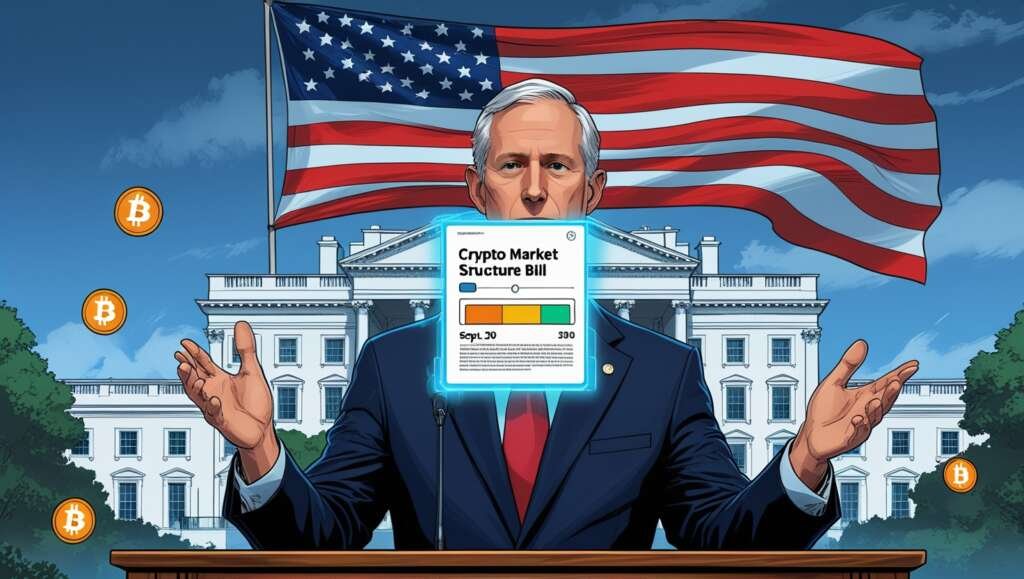U.S. Senate Banking Committee Chair Tim Scott has announced a deadline when he thinks Congress will finalize the crypto market structure bill. The senator, at a press event with fellow Republicans, told the White House adviser Bo Hines that legislation regarding the bill will be finalized by September 30. This is later than President Donald Trump’s August target but earlier than Senator Cynthia Lummis’s year-end projection. He also called on the House to promptly pass the Senate-approved GENIUS Act on stablecoins.
Scott shared how some of his fellow Republican senators want the market’s regulations to be. He wants a timeline where the market structure bill will be completed before the end of September. Agreeing to that, Senator Cynthia Lummis, who heads a subcommittee on digital assets, said they would do as Scot says.
What the Market Structure Bill Entails
The Market Structure Legislation lays the groundwork for how crypto will be traded and operated, with customer protection in mind. The bill aims to provide clarity as to what defines a digital asset as security or commodity.
It will also establish regulatory boundaries between the SEC and the CFTC. Furthermore, it will set a comprehensive compliance framework for capital requirements, AML/KYC, and crypto custody. The bill is different from the GENIUS Act that focuses on Stablecoins.
The Market Structure Bill will provide clarity on asset classification, which has been an issue in the crypto space. It will mitigate the regulatory ambiguity that’s been hunting crypto exchanges and projects. By preventing overlap between the SEC and CFTC, the crypto market will be more stable, competitive, and credible.
The Legislation Will Have Ripple Effects Across the Crypto Industry
The Market Structure Bill is a genius move by the Senate Banking Committee that will help exchanges trading on U.S. soil to be stronger. Clear rules will reduce legal risks and allow crypto platforms to be innovative but in complete compliance.
In addition, proper guidelines will bring transparency and on-chain accountability to DeFi protocols. It will legitimize DeFi trading, and also onboard more retail and institutional traders, boosting liquidity.
The bill, combined with the GENIUS Act, could see the United States become a regulatory safe haven for compliant crypto companies. It would put the country on par with the EU and Singapore – who have both set a benchmark on how to combine innovation plus regulations.
The GENIUS Act Passage Still Stalls in House
Meanwhile, some House lawmakers are hesitant to move forward with the bills on crypto market structure bill and the GENIUS Act. The House had been in on the former issue, with its Clarity Act having cleared all necessary committees all the way to the House floor.
However, the chairman of the House Financial Services Committee, French Hill, believes that the GENIUS Act and the House’s stablecoin legislation have some discrepancies. This suggests a lengthier process, which could jeopardize the deadlines the Senate has in mind.
President Donald Trump favored the House signing off on the stablecoin bill earlier approved by the Senate without further debate. Scott said he believes the president’s mandate of signing the Stablecoin Act into law is in the best interest of Americans.
Will the Crypto Market Structure Bill Meet the Sept. 30 Deadline?
Initially, President Donald Trump wanted regulations completed before Congress’s recess in August. However, that wouldn’t have given the Chambers enough time to debate the bill. The September 30 deadline set by Scott is more realistic, but the passage of the bill may still linger past the timeline for various reasons.
First, there may be some political push back from some Democrats, who are wary of loopholes that could be exploited. The bill’s timing is backed by Cynthia Lummis, a core Republican with close ties to Trump. Therefore, Democratic senators will have more reasons to believe the bill has regulatory carve-outs, and would need more time to debate.
Secondly, the bill must clear the Senate Agriculture Committee, even after the Senate Banking Committee clears the bill. This could delay the overall passage of the bill. Senator Lummis admitted that the bill hasn’t been as urgent for the Agriculture Committee. If the bill continues to stall, the SEC or CFTC might act on its way, which could lead to patchwork regulation.




